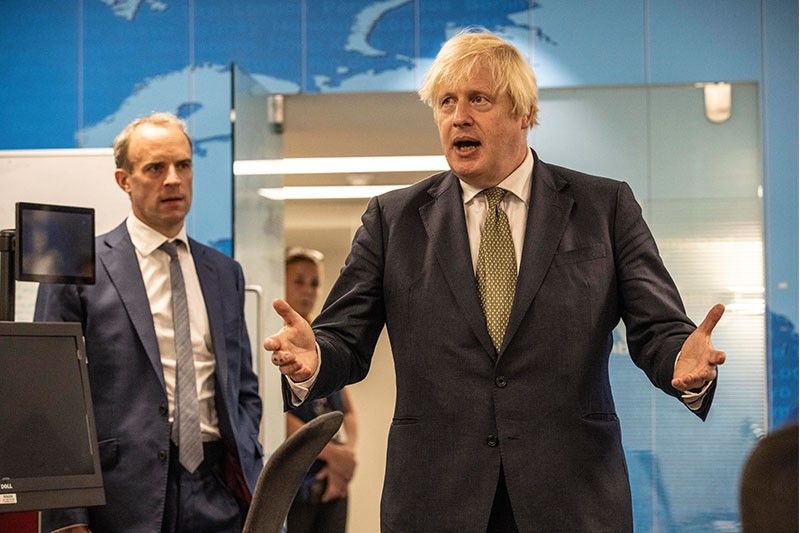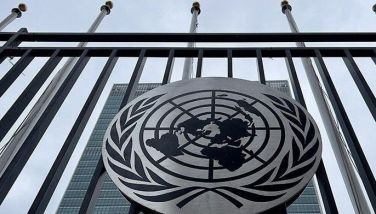PM Johnson says UK owes 'huge debt' to Afghan refugees

LONDON, United Kingdom — Prime Minister Boris Johnson on Wednesday said Britain owed "an immense debt" to Afghans who worked with NATO forces as he announced "vital support" for those resettling in the UK.
But his government is coming under fire after thousands of Afghans who helped NATO and are eligible to move to Britain under the "Relocations and Assistance Policy" were believed to be have been left stranded in Afghanistan, where they are at the mercy of the Taliban.
More than 8,000 did make it out, and the government announced on Wednesday that they will be given immediate indefinite leave to remain and that £15 million would be provided for additional school places and to support access to the health service.
"We owe an immense debt to those who worked with the Armed Forces in Afghanistan and I am determined that we give them and their families the support they need to rebuild their lives here in the UK," Johnson said of the so-called "Operation Warm Welcome" measures.
"I know this will be an incredibly daunting time, but I hope they will take heart from the wave of support and generosity already expressed by the British public."
The government said the measures "will give Afghans the certainty and stability to rebuild their lives with unrestricted rights to work and the option to apply for British citizenship in the future."
But current and former officials have condemned the government, suggesting many more could have been rescued.
The Observer on Sunday cited a whistleblower as saying thousands of emails from MPs and charities to the foreign ministry highlighting specific Afghans at risk from the Taliban takeover went unopened.
Foreign Minister Dominic Raab has already been strongly criticised for not immediately leaving a beach holiday when the Taliban took control.
An unnamed minister also told the Sunday Times that "I suspect we could have taken out 800-1,000 more people".
Raab faces a tough hearing before the Foreign Affairs Committee on Wednesday, when he will be grilled by MPs over the chaotic withdrawal.
Announcing the evidence session, Chair of the Foreign Affairs Committee Tom Tugendhat said that "the last two weeks have been tough for so many of us: anger, shame, even incredulity".
"We never thought we would see the day NATO forces, led by the US, would turn their backs on the people of Afghanistan.
"How will we deal with the Taliban? How will Afghanistan shape our regional strategy? How will the government hold the Taliban to account for reverses in human rights?
"These questions, and so many others, will be put to the Foreign Secretary."
Get the latest news as Taliban gains control of Afghanistan. Photo courtesy of Al Jazeera/AFP
Afghanistan's supreme leader said Sunday the country's women were being saved from "traditional oppressions" by the adoption of Islamic governance and their status as "free and dignified human beings" restored.
In a statement marking this week's Eid al-Adha holiday, Hibatullah Akhundzada -- who rarely appears in public and rules by decree from the Taliban's birthplace in Kandahar -- said steps had been taken to provide women with a "comfortable and prosperous life according to Islamic Sharia".
The United Nations expressed "deep concern" last week that women were being deprived of their rights under Afghanistan's Taliban government and warned of systematic gender apartheid.
Since returning to power in August 2021, Taliban authorities have stopped girls and women from attending high school or university, banned them from parks, gyms and public baths, and ordered them to cover up when leaving home.
They have also barred them from working for the UN or NGOs, while most female government employees have been dismissed from their jobs or are being paid to stay at home.
However, Akhundzada said "necessary steps have been taken for the betterment of women as half of the society".
"All institutions have been obliged to help women in securing marriage, inheritance and other rights," his statement read. — AFP
UN chief Antonio Guterres will gather international envoys at a secret location in Doha on Monday in an increasingly desperate bid to find ways to influence Afghanistan's Taliban rulers. — AFP
The UN Security Council adopted a resolution Thursday calling on Taliban authorities to "swiftly reverse" all restrictive measures against women, condemning in particular its ban on Afghan women working for the United Nations.
The resolution, unanimously adopted by all 15 Council members, said the ban announced in early April "undermines human rights and humanitarian principles."
More broadly, the Council called on the Taliban government to "swiftly reverse the policies and practices that restrict the enjoyment by women and girls of their human rights and fundamental freedoms."
It cited access to education, employment, freedom of movement, and "women's full, equal and meaningful participation in public life."
The Council also urged "all States and organizations to use their influence" to "promote an urgent reversal of these policies and practices." — AFP
G7 foreign ministers on Tuesday demanded the "immediate reversal" of a ban on women in Afghanistan working for non-governmental organisations and the United Nations.
"We call for the immediate reversal of unacceptable decisions restricting human rights and fundamental freedoms, including the latest bans prohibiting Afghan women from working for NGOs and the UN," the top diplomats said in a statement after two days of talks in Japan.
The group also slammed the Taliban authorities' "systematic abuses of human rights of women and girls and discrimination against the members of religious and ethnic minorities".
Taliban authorities triggered international outrage this month after extending a December ban on Afghan women working for non-governmental organisations to include the UN.
They have rejected criticism over the move, saying it is an internal issue that should be "respected by all sides." — AFP
The United Nations is being forced to make an "appalling choice" over whether to continue operations in Afghanistan while the Taliban government bans women from working for the organisation, the world body says.
Under their austere interpretation of Islam, Taliban authorities have imposed a slew of restrictions on Afghan women since seizing power in 2021, including banning them from higher education and many government jobs.
In December, they banned Afghan women from working for domestic and foreign non-governmental organisations, and on April 4 extended that to UN offices across the country.
In a statement Tuesday, the UN mission in Afghanistan said the ban was "unlawful under international law, including the UN Charter, and for that reason the United Nations cannot comply".
"Through this ban, the Taliban de facto authorities seek to force the United Nations into having to make an appalling choice between staying and delivering in support of the Afghan people and standing by the norms and principles we are duty-bound to uphold," it said. — AFP
- Latest
- Trending



































